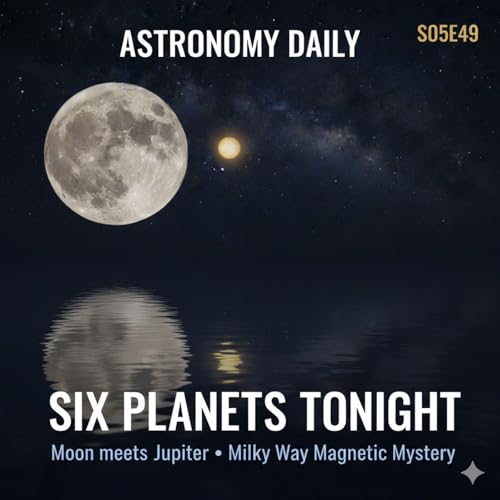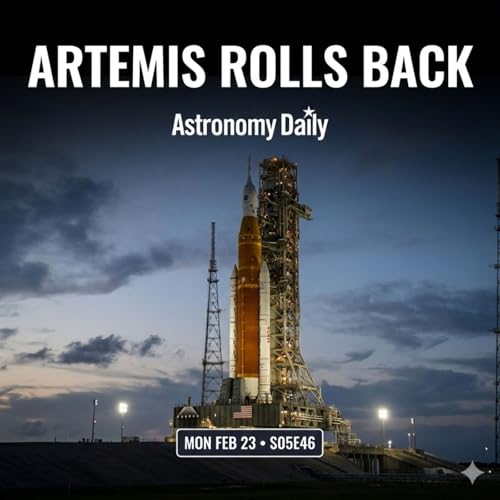NASA rewrites the Artemis roadmap, the Space Force grounds Vulcan Centaur, astronomers peer back 11 billion years to the universe's most extraordinary construction site, water bears reveal surprising secrets about Martian soil, NASA passes a key milestone in extracting oxygen from lunar regolith, and ancient stellar lighthouses rewrite the Milky Way's origin story. Plus — six planets in tonight's sky.📰 STORIES THIS EPISODE1 — NASA Overhauls the Artemis Programme NASA Administrator Jared Isaacman announced a sweeping restructure of the Artemis Moon programme on Friday 27 February. The headline change: Artemis III will no longer attempt a crewed lunar landing. Instead it has been redesigned as a low Earth orbit test flight in 2027, where astronauts will dock with the SpaceX Starship Human Landing System and potentially Blue Origin's Blue Moon lander, testing suits, life support and rendezvous procedures before anyone attempts a surface landing. The Block 1B SLS upgrade has been scrapped, vehicle configuration standardised, and NASA is targeting annual Moon landings from Artemis IV and V in 2028, with at least one surface landing per year thereafter. Isaacman invoked Apollo's step-by-step approach as his model — pointing out the programme was essentially jumping from Apollo 8 to the Moon landing without the intervening tests. The Lunar Gateway space station was notably absent from the announcement. Artemis II — the crewed flight around the Moon — remains on track for no earlier than 1 April 2026 pending resolution of a helium pressurisation issue. 2 — Space Force Grounds Vulcan Centaur The U.S. Space Force has placed an indefinite hold on all national security launches aboard ULA's Vulcan Centaur rocket following a repeat solid rocket booster anomaly during the USSF-87 mission on 12 February — the rocket's fourth flight. A booster nozzle appeared to separate during ascent, mirroring an incident on Vulcan's second certification flight in October 2024. The payloads were successfully delivered, but Space Force Col. Eric Zarybnisky confirmed at the AFA Warfare Symposium that no further Vulcan national security missions will fly until the issue is fully resolved. With over a dozen military launches manifested for 2026, the grounding threatens significant disruption to the Pentagon's launch schedule. 3 — The Universe's Most Extraordinary Construction Site Astronomers using the Very Large Array and ALMA telescope have discovered J0846 — the first strongly gravitationally lensed protocluster core ever found. A foreground galaxy cluster is acting as a cosmic zoom lens, magnifying a cluster of at least 11 furiously star-forming galaxies more than 11 billion light years away — all crammed into a region smaller than the distance between the Milky Way and Andromeda. Completely invisible to optical telescopes due to dense dust shrouding, ALMA's detection of cold dust and gas revealed the extraordinary scene. Lead researcher Nicholas Foo (Arizona State University) describes it as catching a galaxy cluster in the very first chapter of its life. 4 — Could Mars Soil Actually Block Earth Microbes? A Penn State-led international team published findings in the International Journal of Astrobiology showing that simulated Martian regolith significantly suppresses tardigrade (water bear) activity — one of the toughest creatures on Earth. Critically, rinsing the regolith with water largely reversed the harmful effect, suggesting the culprit is a water-soluble compound — possibly salts or perchlorates detected by previous Mars missions. The dual implication: Martian soil may naturally protect the Red Planet from Earth contamination, and could potentially be treated to support plant growth in future habitats. 5 — Extracting Oxygen from Lunar Soil — A Major Milestone NASA's Carbothermal Reduction Demonstration (CaRD) project has passed a key integrated prototype test aboard the ISS, confirming that concentrated solar energy can drive a chemical reaction in simulated lunar regolith to produce carbon monoxide — which can then be converted into breathable oxygen. Lunar regolith is approximately 45% oxygen by mass, locked in silicate minerals. The integrated system combines hardware from Sierra Space, NASA Glenn, Composite Mirror Applications, and Kennedy Space Center. Beyond breathing air, the process could produce rocket propellant in-situ — directly relevant to this week's Artemis restructuring and the goal of a permanent lunar presence. 6 — Ancient Stellar Lighthouses Rewrite the Milky Way's Origin Story Using the largest-ever catalogue of RR Lyrae variable stars — ancient pulsating 'cosmic lighthouses' over 10 billion years old — combined with ESA's Gaia satellite data, a large international team has found that the Milky Way's structural layers (halo, thick disk, thin disk) all formed at roughly the same early epoch, not sequentially as long assumed. The layers differ ...
Más
Menos
 17 m
17 m 22 m
22 m Feb 27 202622 m
Feb 27 202622 m 13 m
13 m Feb 25 202615 m
Feb 25 202615 m Feb 24 202621 m
Feb 24 202621 m 12 m
12 m 16 m
16 m
